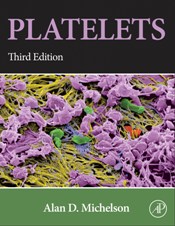
Edited by Alan Michelson, MD
The textbook marketplace is crowded with many titles pertinent to the topic of hemostasis and thrombosis, and the field is becoming increasingly complex, with the addition of new antiplatelet medications and novel, target-specific therapeutic agents.
It has become incumbent for hematologists and oncologist-hematologists who care for or consult on patients with any disease process involving platelets to understand the pathophysiology and rationale of treatment of these disorders.
This third edition of Platelets is again an aggregation of the most prominent physicians, physician-scientists, and basic researchers in platelet biology and clinical hemostasis.
Very much an encyclopedia of platelet biology, Platelets is an informative tome that will serve as a comprehensive resource for the busy clinician, the academic hematologist preparing for lectures on platelet physiology and hemostasis, the basic scientist preparing a research grant, the house officer trying to understand treatment algorithms, the blood banker who runs a busy transfusion service, and the clinical pathologist who supervises a coagulation laboratory.
The foreword chapter by Dr Barry Coller sets the tone for the book, with a thoughtful, interesting, and easily readable overview of the platelet in health and disease.
Over the next 63 chapters and more than 1300 pages, the platelet is examined as an active organ that expresses mRNAs from one-quarter to one-third of the human genome; contains a highly adaptive proteome responsive to external signals of both healthy and pathological processes; and can then participate directly and indirectly as modulators of hemostasis, inflammation, immunology, atherogenesis, angiogenesis, carcinogenesis, etc.
The chapters on laboratory measurements of platelet function and interpretation thereof are very useful and provide practical information for the clinician and clinical laboratorian. The review of the new antiplatelet aggregating agents succinctly and comprehensively describes their pharmacology and their appropriate placement in therapeutic algorithms of many disease processes.
Similarly, the chapters on thrombopoietin and autoimmune thrombocytopenia provide critical insight on the appropriate use of and the potential complications associated with use of the new thrombopoietic agonists.
Finally, the chapters that concentrate on the blood banking aspects of platelet therapy and platelet disorders are particularly well-written and understandable. The chapters on the pathogenesis, diagnosis, and treatment of neonatal alloimmune thrombocytopenia and post-transfusion purpura are very helpful, and I found myself consulting them in my clinical practice, even as I was preparing this review on Platelets.
In summary, Platelets fills an important niche on the bookshelf of any academic hematologist. The user- friendly online access to the figures contained in the textbook will be especially useful for teaching purposes. Notwithstanding its considerable size and weight, this encyclopedia of the platelet contains critical information for physicians, educators, students, and research scientists.
Craig M. Kessler, MD, MACP
Lombardi Comprehensive Cancer Center
Georgetown University School of Medicine, Washington, DC

